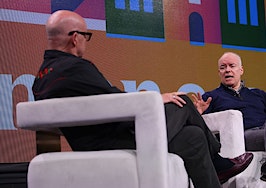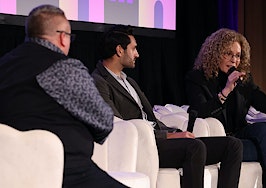Inman Connect New York is LIVE this week! Experience the pulse of the real estate industry in person or join us from anywhere in the world — the future of real estate is unfolding now. Get your virtual ticket here.
Although the National Association of Realtors may “be in flames,” as panel moderator Clelia Peters said during an ICNY session entitled “Brokerage Head to Head” on Thursday, and the future of representation in real estate is still uncertain, major luxury brokerage leaders said that the focus remains on supporting agents and fostering community.

Clelia Peters | Era Ventures
“Focus on where you can add value and block out the rest of the noise,” Brad Nelson, CMO of Sotheby’s International Realty, said.
Rory Golod, Compass’ SVP of growth and communications, added that brokerages should look at today’s industry challenges as an opportunity.
“I think our industry gets very preoccupied by shiny objects, positive and negative,” Golod said. However, many Compass agents are viewing changes to buyer representation as an exciting opportunity to generate more income.
With agents now potentially having to get clients to sign buyer broker agreements in a new era for the industry, Douglas Elliman CEO and President Scott Durkin said that the transition will be a challenge, but one that Douglas Elliman was prepared for.
“Each side now will really have to show their goods,” he said.

Scott Durkin | Douglas Elliman
The luxury leaders agreed that high-net-worth clientele are certainly responding to changes in the market, like fluctuating rates, in a different way than the market at large. Although luxury clients aren’t necessarily concerned about expense, they care about being smart with their money and are much more in tune to the overall stability of the market than other buyers or sellers, the panelists said.
“We feel that the people that can afford to do this and use their private banking relationships to have money given to them at a much lower rate, they’re moving along in the market,” Durkin said. “For the most part, I’d be worried about first-time buyers. They can’t afford to pay a commission right now.”
Nelson noted that the S&P 500’s favorable moves have also been fueling movement in the luxury market.

Bradley Nelson | Sotheby’s International Realty
Golod specified that luxury clients are more sensitive to how fluctuating interest and mortgage rates will impact their total financial portfolio.
“On the luxury side, it’s ‘I have X number of millions in bonds, crypto, etc.,’ and it’s more about certainty or uncertainty.”
The kind of market uncertainty in the last year or so also helped fuel more moves by high-net-worth individuals to tax-favorable states (on the heels of pandemic-related migrations to these places), like Texas, Durkin added, to help their money go further. “The low-tax states are really cashing in on this,” he said.
In one way or another, though, each brokerage leader felt that a part of their company’s community or culture helped them to stand apart from the rest.

Rory Golod | Compass
Sotheby’s International Realty, for instance, has what Nelson called a “community” (as opposed to the colder “network”) across 81 countries, which helps luxury agents create valuable connections around the world.
“It’s really about how do [agents] capitalize on that community to build their portfolio,” he said.
Although Compass has often touted its technology as a value proposition in the past, Golod threw a curveball and said the brokerage’s support in helping agents make more money and save more time is what sets them apart from the rest.
“We’re thinking about it, not so much as it’s this one thing we do. We’re thinking about how we can make you more money and save you time,” he said.
Meanwhile, Durkin said that no other brokerage could hold a candle to Douglas Elliman’s culture.
“The agents really love our culture,” the CEO said. “There’s a lack of that elsewhere.”
“The agent is our client, and they’re No. 1 for us,” Durkin added.













